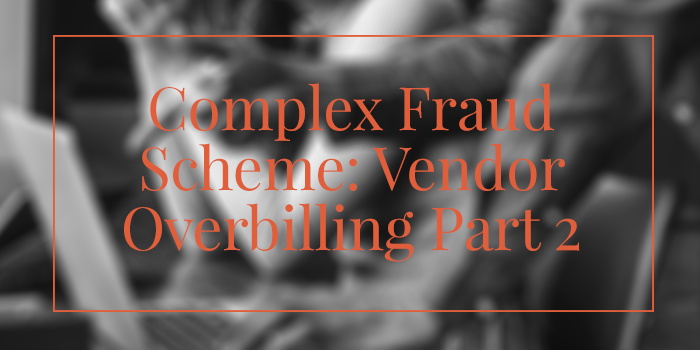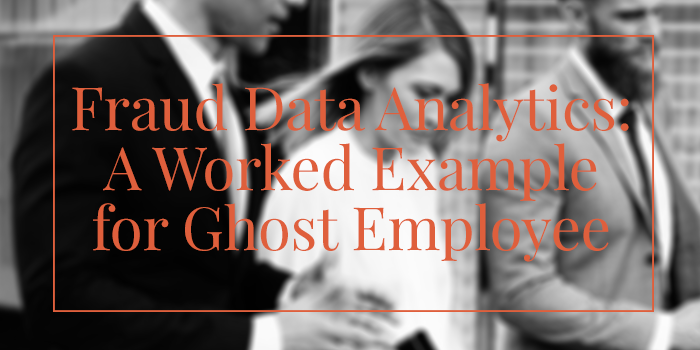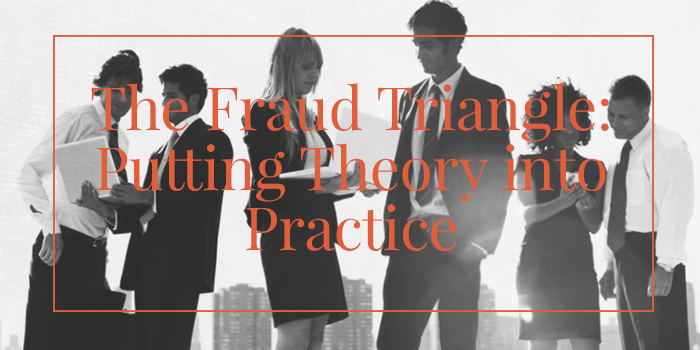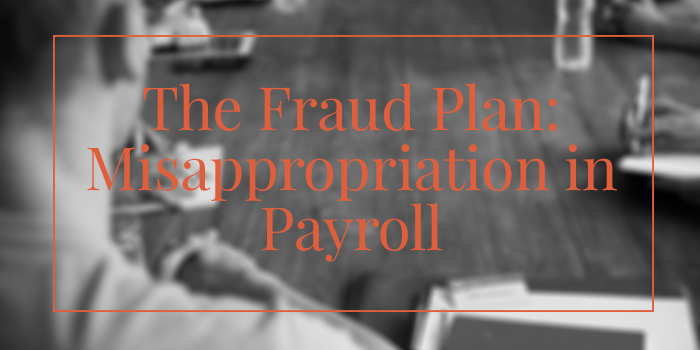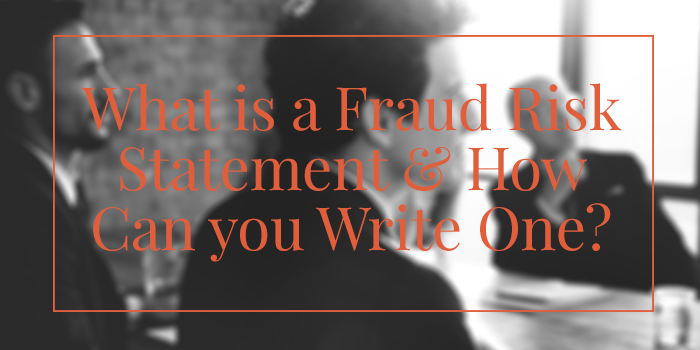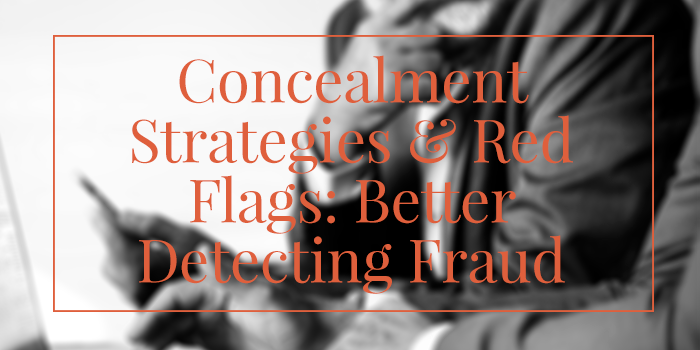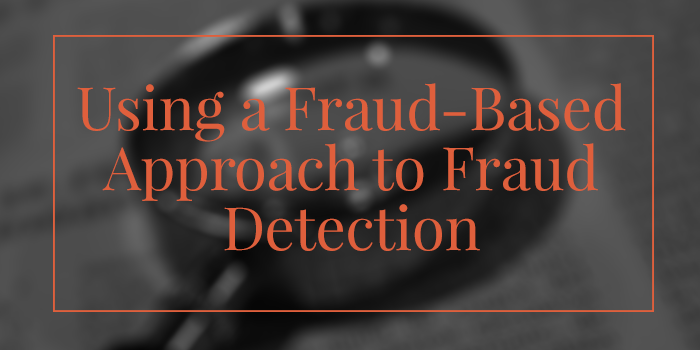Fraud Analytics: Planning considerations
Fraud Auditing, Detection, and Prevention Blog
Uncovering Fraud Using Fraud Data Analytics: Part 3 + 4
Mar 26, 2019 4:55:40 PM / by Leonard W. Vona posted in Fraud Data Analytics, Fraud Risk Statements, ...
Uncovering Fraud Using Fraud Data Analytics: Part 1
Dec 1, 2018 7:45:04 AM / by Leonard W. Vona posted in Fraud Data Analytics, Fraud Risk Statements, ...
This blog is the first in a series of seven to explain how to perform fraud data analytics. It introduces a ten-step approach along with explaining the concept of fraud auditing.
For years, auditors, myself included, would launch a fraud detection project by getting the data and playing with the data. At least that was the expression. We hoped to trip across a fraud scheme. We had no specific plan, just a simple goal: Find fraud. We did not know what we were looking for, but we were looking. Eventually, we hoped to find something. But, those days are over.
Complex Fraud Scheme: Vendor Overbilling Part 2
Aug 6, 2018 9:47:00 AM / by Leonard W. Vona posted in Fraud Data Analytics, Fraud Risk Statements, ...
This is part two of a blog post series examining a worked exampled using fraud data analytics on a complex fraud scheme.
In this post we will look at how to use fraud data analytics designed to uncover the complex fraud scheme and the fraud audit procedures designed to provide creditable evidence that the scheme is being perpetrated by the budget owner.
Fraud Data Analytics: A Worked Example for Ghost Employee Fraud Schemes
Jul 12, 2018 12:38:00 PM / by Leonard W. Vona posted in Fraud Data Analytics, Fraud Schemes, ...
Ghost employee schemes are a common fraud scheme during which there are people on the payroll who don’t work for the company in question but do collect a salary or remuneration.
Let’s take a closer look at how you can use fraud data analytics when creating an executing an audit program for ghost employees:
The Fraud Triangle: Putting Theory into Practice
Jul 6, 2018 1:06:00 PM / by Leonard W. Vona posted in Fraud Auditing, Fraud Detection, ...
The fraud triangle, authored by Dr. Cressey, has been adopted by the auditing profession as a tool to help detect and deter occupational fraud.
The model has many applications in the fraud audit. The primary purpose is in the planning stage to help identify where and why your organization would be vulnerable to someone committing a fraud risk scenario.
Here’s a closer look at the fraud triangle and how you can implement this model.
The Fraud Plan: Misappropriation in Payroll
Jul 2, 2018 10:48:00 AM / by Leonard W. Vona posted in Fraud Risk Statements, Fraud Auditing, ...
How you determine which concepts to evaluate to “consider fraud” and how to integrate fraud into your audit program is a challenge that is easily solved if you approach it with the scope and objectives of your audit clearly defined.
What is a Fraud Risk Statement & How Can You Write One?
Jun 18, 2018 11:02:00 AM / by Leonard W. Vona posted in Fraud Risk Statements, Fraud Detection, ...
There tends to be a fair amount of confusion when it comes to a fraud risk identification approach versus an experience-based approach – in no small part because within the industry it’s not uncommon to see terms used interchangeably – but here we set out to create a list of universal definitions intended to clarify how and why you might use this approach.
Concealment Strategies & Red Flags: Better Detecting Fraud
Apr 24, 2018 1:00:00 PM / by Leonard W. Vona posted in Concealment Strategies, Red Flags, ...
As per the commonly understood fraud triangle there, are three typical components why someone would commit a fraud scheme: motive, opportunity, and rationalization. While motive and rationalization are factors that could be limited to individual behavior and psychology, opportunity is something your internal controls can and should account for.
Within rationalization, anyone involved in a fraud scheme needs to have the ability and opportunity to conceal and commit fraud. There is a direct relationship between having the opportunity to commit fraud and having the ability to conceal the fraud and so auditors need to consider both opportunity and the ability to conceal in the design of an audit plan.
Knowing which common concealment strategies might have been deployed by any given fraud scheme is an essential part of any approach to preventing and detecting fraud. Let’s examine concealment in more detail.
Using a Fraud-Based Approach to Fraud Detection
Apr 11, 2018 1:00:00 PM / by Leonard W. Vona posted in Fraud Based Approach, Fraud Detection ...
It is often the case that fraud scenarios are not as simple as meets the eye. Most financial executives are aware of the importance of having internal controls in fraud prevention and detection, yet few realize the potential fraud-based approaches have in finding complex fraud that is often overlooked by basic evidence of control measures.
While no fraud methodology is entirely foolproof, taking a systematic and methodical approach to data by finding hidden patterns is a proven and robust approach to detection. This is something we’ve been specializing in for over 30 years at Fraud Auditing Inc., and so we have a wealth of experience in the area.
Here’s a look at how you can implement a fraud-based approach in your organization and its advantages.





